So this happened:
The guy who said the election was rigged won the presidency with the second-most votes
— Josh Levin (@josh_levin) November 9, 2016
Trump agreed the system was unfair four years ago, although I’m not quite sure what his reasoning was.
The electoral college is a disaster for a democracy.
— Donald J. Trump (@realDonaldTrump) November 7, 2012
And this is what else he had to say back then:
Lets fight like hell and stop this great and disgusting injustice! The world is laughing at us.
— Donald J. Trump (@realDonaldTrump) November 7, 2012
This election is a total sham and a travesty. We are not a democracy!
— Donald J. Trump (@realDonaldTrump) November 7, 2012
Our country is now in serious and unprecedented trouble…like never before.
— Donald J. Trump (@realDonaldTrump) November 7, 2012
The cartoonists made a few predictions before the election about what they thought a Trump presidency would look like:
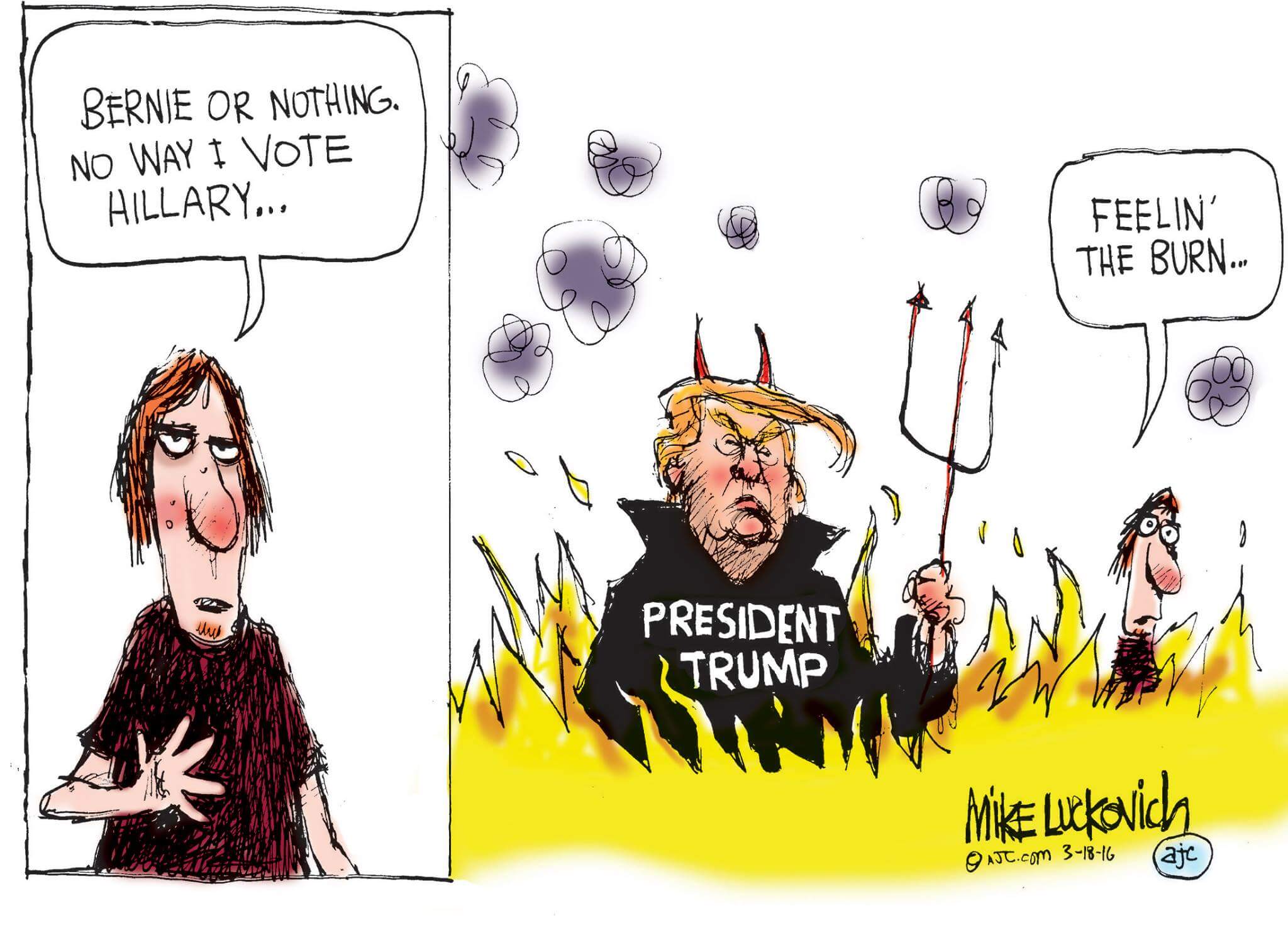 I should be a bit wary of making predictions given how badly I got it on the election. At least I wasn’t a lone voice – most pundits thought similar things to me. Even texts to CNN political reporters from Trump insiders on election night were apparently saying things like, “It’ll be a miracle if we win.” It sounds like even they didn’t expect a Trump victory.
I should be a bit wary of making predictions given how badly I got it on the election. At least I wasn’t a lone voice – most pundits thought similar things to me. Even texts to CNN political reporters from Trump insiders on election night were apparently saying things like, “It’ll be a miracle if we win.” It sounds like even they didn’t expect a Trump victory.
In the swing states, there were 90 electoral college votes that went to Trump that would have gone to Clinton if third party voters had chosen her. Bill Weld (the Libertarian VP nominee) openly stated in interviews that he considered that Trump was unqualified to be president and Clinton was the preferable choice of the two. I’ve no doubt Green party voters would prefer Clinton to Trump as well. He is a climate change denier, who has even said that he thinks climate change science is a conspiracy theory:
The concept of global warming was created by and for the Chinese in order to make U.S. manufacturing non-competitive.
— Donald J. Trump (@realDonaldTrump) November 6, 2012
Here’s a list of some of the things Trump said he’d do on his first day in office:
1. On 7 January in Burlington, Vermont, Trump said:
I will get rid of gun-free zones on schools, you have to, and on military bases; my first day it gets signed, okay. My first day. There’s no more gun free zones.
Perhaps commenters could help me here, but I’m not sure Trump can keep his promise to make schools and everywhere else places where guns are allowed. Does the president actually have the power to sign a bit of paper that forbids gun-free zones throughout the country, including on military bases? In many cases aren’t these state laws, and the last thing Republicans want is a president telling them what to do in their states.
Further, contrary to what many seem to think, it was not President Obama who decided soldiers on bases shouldn’t have their weapons on them at all times, but military leaders. I think they would be horrified if President Trump overrode them in this way.
2. On 28 June in Johnstown, Pennsylvania, he said that on Day One he would notify Canada and Mexico that NAFTA had to be renegotiated:
I’m going tell our NAFTA partners that I intend to immediately renegotiate the terms of that agreement to get a better deal – by a lot, not just a little, by a lot – for our workers And if they do not agree to a renegotiation – which they might not, because they’re so used to having their own way. Not with Trump: They won’t have their own way – then I will submit notice under Article 2205 of the NAFTA agreement that America intends to withdraw from the deal.
Canadian Prime Minister Justin Trudeau has preempted Donald Trump on this issue already, announcing the day after the election:
Canada has no closer friend, partner, and ally than the United States. We look forward to working very closely with president-elect Trump, his administration, and with the United States Congress in the years ahead, including on issues such as trade, investment, and international peace and security.
Canada is very vulnerable in relation to trade with the United States because they are by far their biggest trading partner though some provinces are more vulnerable than others. Ontario send over 80% of their exports to the United States for example, while the figure for British Columbia is closer to 50%. However, if Donald Trump starts slapping tariffs on exports to the US, the damage could be severe.
Trudeau is eminently sensible to preempt this, and also to mention “international peace and security” in his statement. Trump doesn’t yet appear to realize that not everything is about money. Once he starts getting proper security briefings he’ll hopefully appreciate that he needs Canada in other ways such as the Five Eyes intelligence alliance.
Trump is also yet to realize that he’s far better off maintaining a positive relationship with Mexico’s leadership. His failure to recognize the value of soft power and friendly diplomatic relations is symptomatic of his ignorance and the reason people like me worry about his ability to lead the most powerful nation on earth. Perhaps someone could at least explain to him that the maintenance of of international friendships actually saves money too – surely that point at least would get his attention.
Further, it is better for the US to facilitate economic growth in countries like Mexico, because it makes people more likely to choose to stay home rather than make the dangerous journey north.
I must say though that what he and President Obama discussed in their first meeting on 10 November seems to have subdued Trump. He came out of that meeting appearing to have at least a small awareness of the awesome responsibility that would soon be his. That’s positive, but it doesn’t make me feel any better about the quality of his judgment.
3. On 27 August in Des Moines, Iowa he said he’d begin the process of removing the “gangs of thugs” within one hour of taking office.
The first piece of paper that I’m gonna sign is we gonna get rid of these people … we’re gonna get rid of them Day One. We start Day One.
I understand where he’s coming from on this one. The only reason I have a problem with Trump here is that the way he speaks about the issue. For example, on the last day of the Republican convention he said:
Nearly 180,000 illegal immigrants with criminal records, ordered deported from our country, are tonight roaming free to threaten peaceful citizens.
“Criminal records” here includes every conceivable crime from jay-walking to serial rapist and murder. Most of the 180,000 are no threat to US citizens whatsoever.
4. On 31 August in Phoenix, Arizona he said:
On Day One we will begin working on an impenetrable, physical, tall, powerful, beautiful, southern border wall.
And some of Trump’s supporters are looking forward to that wall in a unique way:
https://twitter.com/ShaunKing/status/796550312215646209?ref_src=twsrc%5Etfw
This is the problem with the way Trump has been talking about the immigration issue. He has rightly identified that there are a lot of citizens in the country who feel that their problems have been ignored and they have not been seen as people.
However, there are a lot of citizens that Trump seemingly doesn’t recognize as people if the way he speaks about them is any indication. His rhetoric encourages the bullying instincts of many, and a lot of people are now genuinely scared because of a nasty underbelly that now feels able to express itself in the same way he did.
@CyborgN8VMari pic.twitter.com/sG3Nmt5C1p
— Lucky (@mosaicgraffiti) November 10, 2016
This is happening because of the way Trump ran his campaign:
(Source: http://www.vanityfair.com/news/2016/11/how-the-polls-gave-us-president-trump )
5. Also on 31 August in Phoenix, he promised to repeal all of Obama’s unconstitutional executive orders.
He’s actually given himself an “out” there with the use of the word “unconstitutional.” Any complaints about him not repealing an executive order and he can just day it was “constitutional,” which most of them were. The point also needs to be made that Obama felt the need to use executive orders to try and get things done because Congress was consistently deliberately obstructionist.
6. And again on 31 August in Phoenix, he vowed to suspend the immigration of refugees from Syria and Libya.
I don’t know whether Trump understands the difference between immigrants and UNHCR refugees. If he doesn’t, he’s demonstrating an ignorance a president shouldn’t have. If he does, which is actually more likely because he’s not stupid, that means he’s lying and fearmongering by deliberately conflating the two to get support.
And more hate as a result:
7. On 6 September in Greenvile, North Carolina made the ridiculous but popular statement:
I’m gonna convene my top generals and give them a simple instruction. They will have thirty days to submit to the oval office a plan for soundly and quickly defeating ISIS.
Well good luck to him. But does he really think that if this was possible, the generals wouldn’t have already done this? Does he think that Obama wants DAESH to survive?
The problem is that he doesn’t seem to understand that killing those fighting for the caliphate in Iraq and Syria are not the biggest problem. The biggest problem is the ideology, and you can’t get rid of that by killing people, especially if you do it the way Trump says he wants to – by torturing as well as killing the jihadists, killing their families, and stealing the oil of the country they happen to be occupying.
8. Also 6 September in Greenvile, North Carolina he said this, making it sound like it was the easiest thing in the world to do:
I’m gonna ask Congress to send me a Bill to repeal and replace, finally, Obamacare. It’s a disaster. Under Senate rules that Bill can be passed with 51 votes … meaning a Republican Congress and a Republican president can save American from this disaster in a single afternoon.
Dismantling Obamacare is going to take time, and there’s a lot of preparatory work to do. It’ll likely be a couple of years at least before it’s done.
I’ve written at length what I think the United States needs to do about healthcare provision, and my suggestion beats no resemblance to that of the Republican party. I actually think Trump would like my ideas better given that he’s praised the systems of Scotland and Canada, so let’s see whether he stands up for his principles of folds to the party.
Because Trump has also said he won’t touch Social Security or Medicare, but I saw an interview with House Speaker Paul Ryan today, who was very upbeat about his meeting with Trump. And Ryan said reforming (i.e. cutting) Social Security and Medicare were necessary as part of repealing Obamacare.
9. On 20 September in Williamsburg, Virginia, Mike Pence made the statement:
… and lastly on Day One of this Administration we’re gonna end the War on Coal once and for all.
This is the stupidest thing Trump and Pence have said in their economic arguments. Trump has stated that he’s going to get the coal mines working again. How is he going to do that? Force coal mines to re-open and run at a loss? Subsidize the industry?
Clinton had a good plan on how to deal with the issue of miners who were out of work. (Bernie Sanders did as well, but hers was even better.) It involved investing billions over several years retraining the workers in jobs in other related industries and helping develop those industries. It was part of her strategy of making the United States a leader in green energy and making the country self-sufficient in energy.
(I’ll leave most of the things to do with foreign relations to a later post.)
That’s a lot of things to do on his first day, or even in his first 100 days.
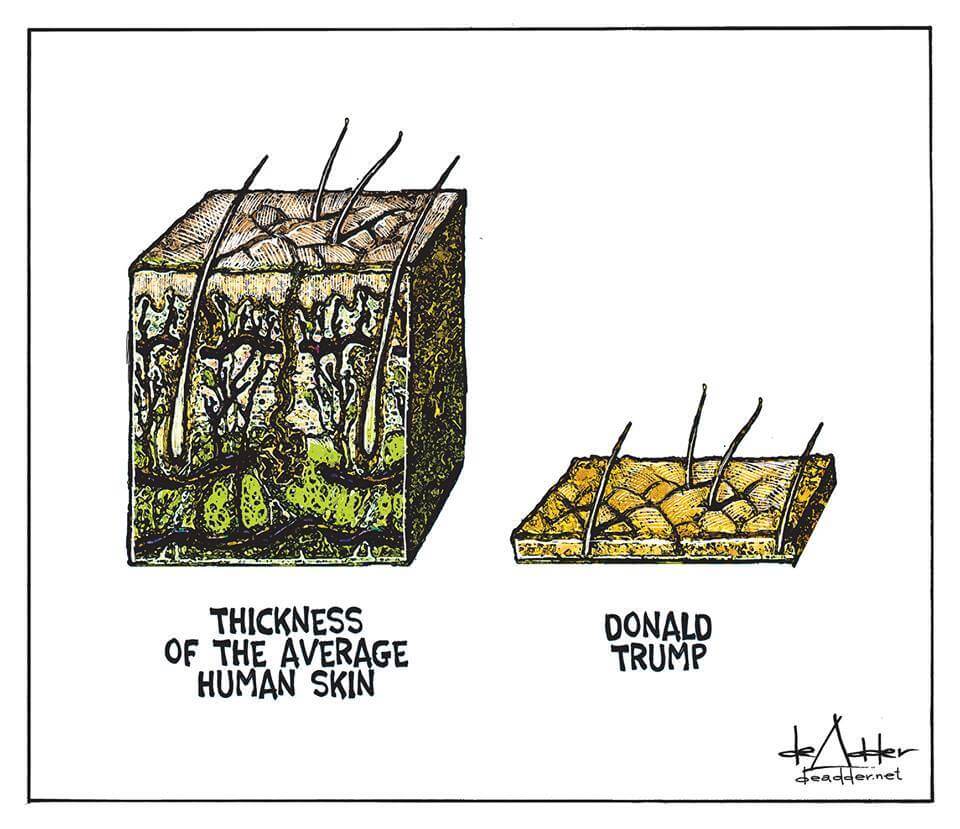 He’s also going to have to make his first pick from that list of potential SCOTUS justices to take the place of the late Antonin Scalia, which will immediately reestablish the 5-4 conservative-liberal balance on the court.
He’s also going to have to make his first pick from that list of potential SCOTUS justices to take the place of the late Antonin Scalia, which will immediately reestablish the 5-4 conservative-liberal balance on the court.
He’s also got 4,000 plus people to appoint to his administration by 20 January 2017, so they’re in place and ready to help him with all of the above.
Then there’s all the women who accused him of sexual harassment that he said he was going to sue for slander “after the election.” He didn’t, of course, say which election.
Apparently he’s considering the following:
Newt Gingrich – Secretary of State
Rudi Giuliani – Attorney General
Ben Carson (who’s an evolution denier) – health or education
Sheriff David Clarke – Homeland Security (see here)
Jared Kushner (Ivanka’s husband) – Chief of Staff
Kellyanne Conway – Press Secretary
Since his election, Trump has been outwardly making all the right moves. But it’s only been two days, and we all know he can’t keep it up. The pressure of the presidency is intense and unlike other presidents elect, he’s facing several court cases as well. The first major one is Trump University. Will the United States soon have a convicted fraudster as president?
The next four years will be a rocky ride.
If you enjoyed this post, please consider donating a dollar or two to help keep the site going.

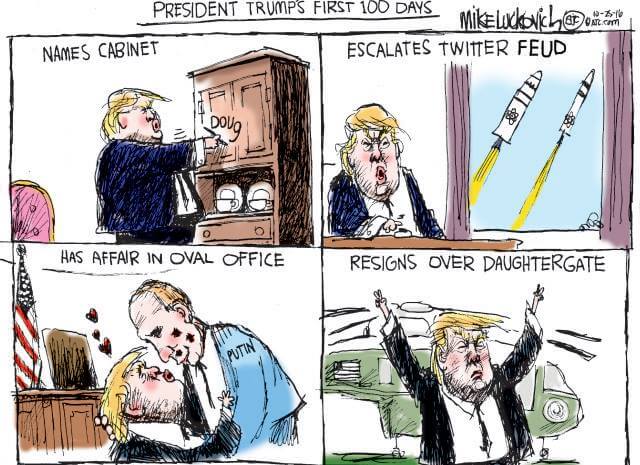
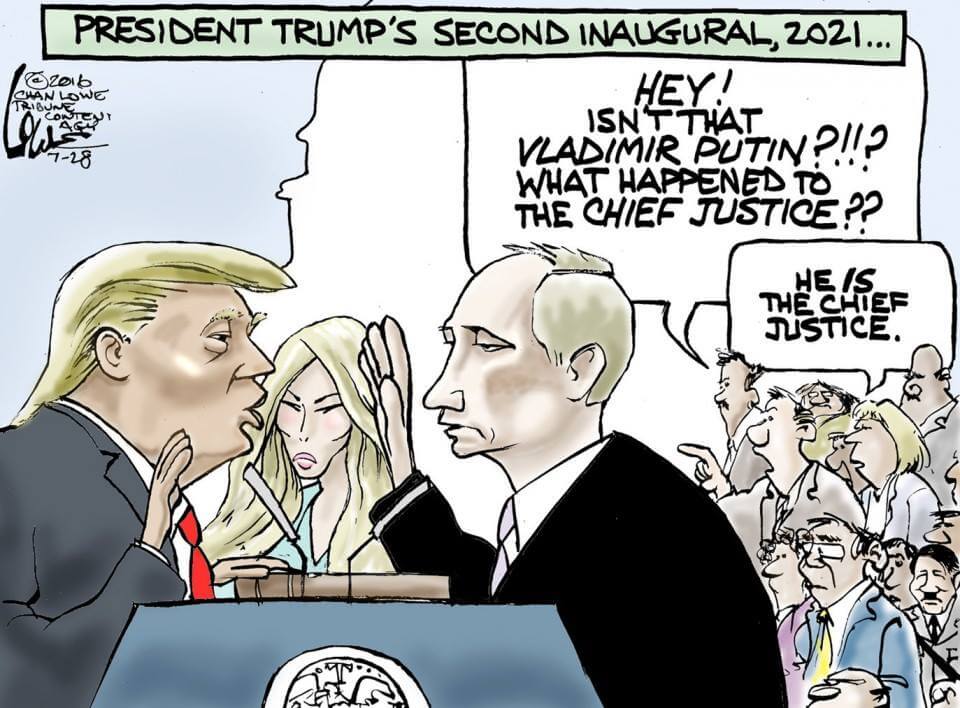
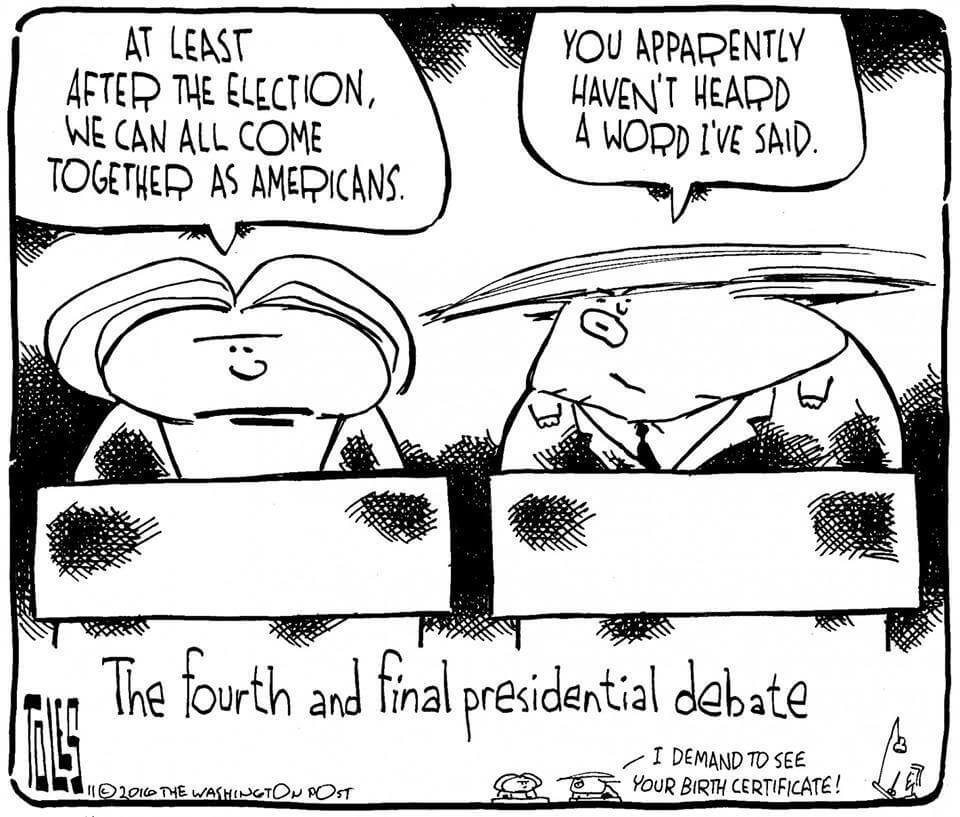
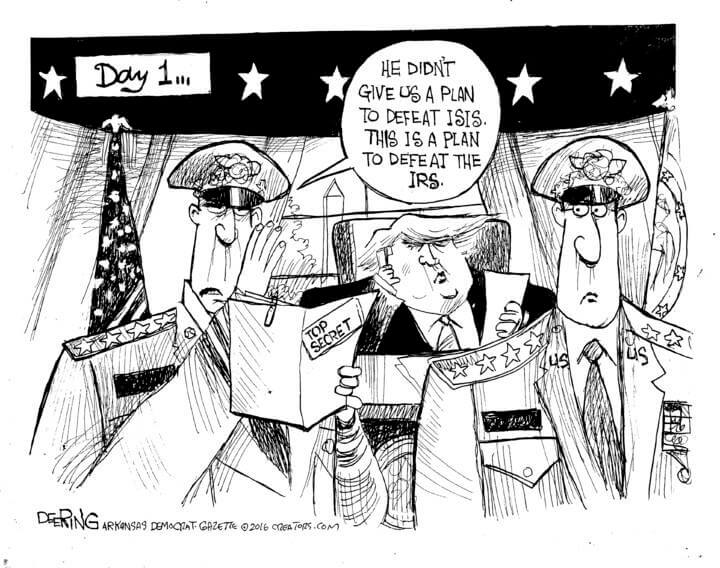
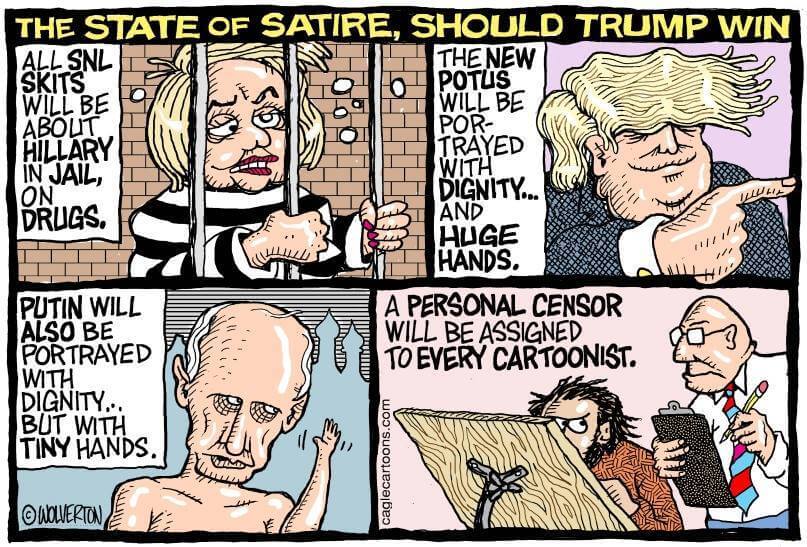
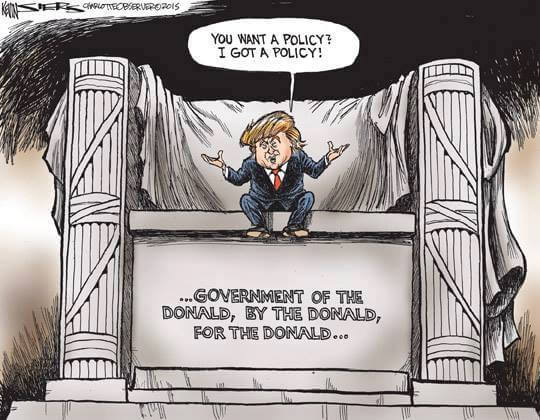
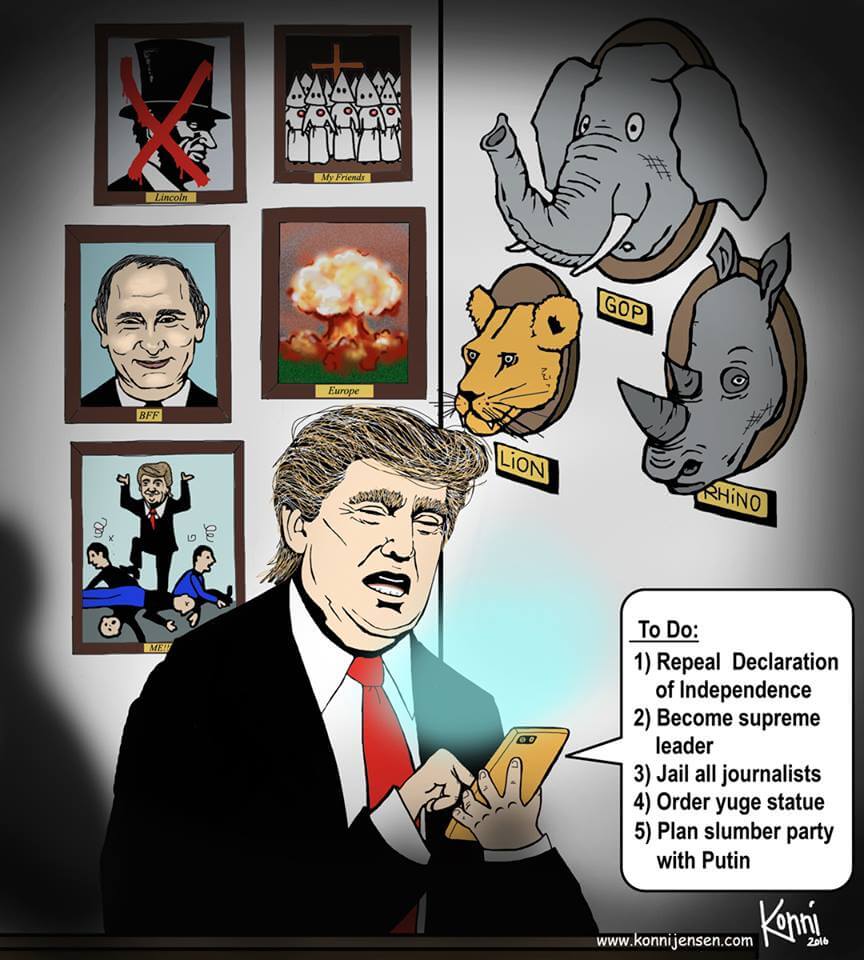
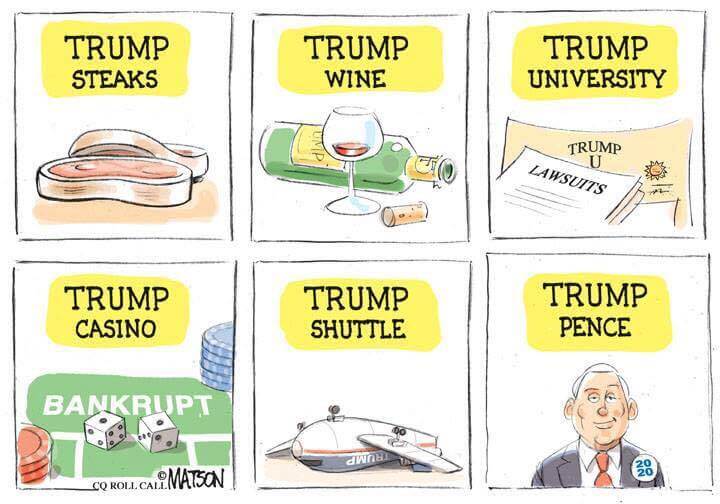
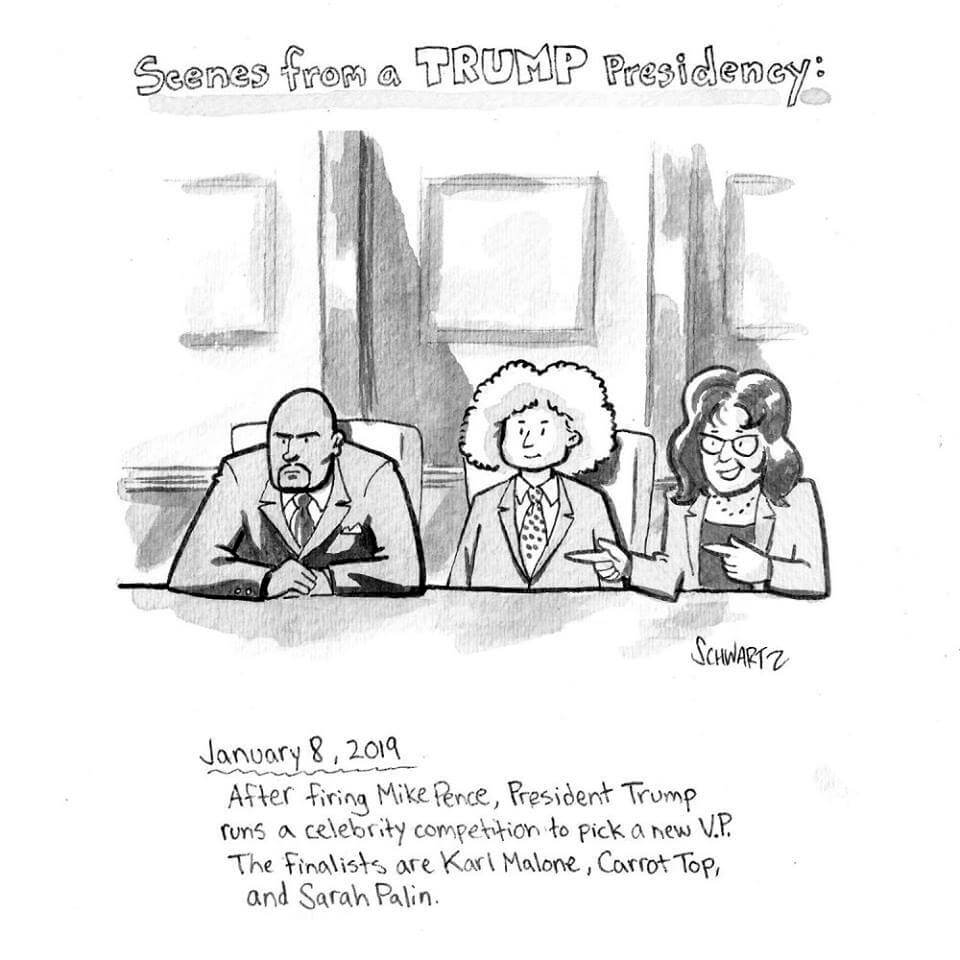
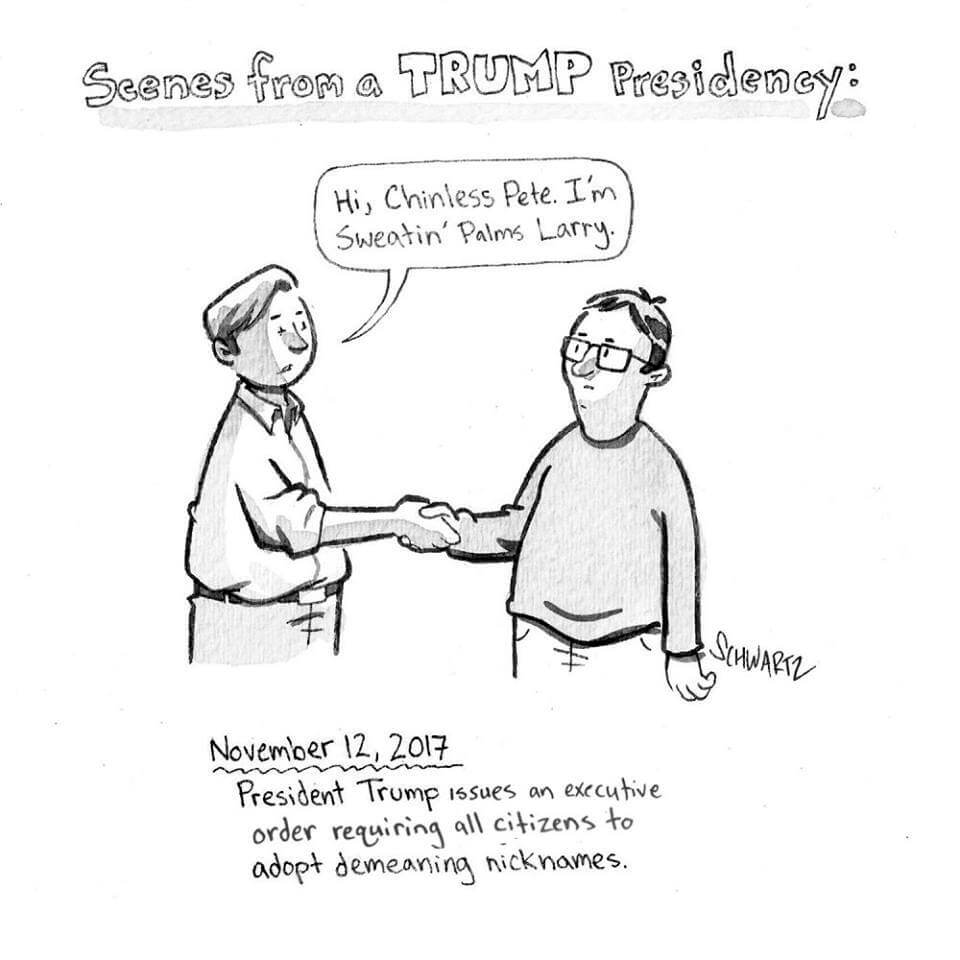
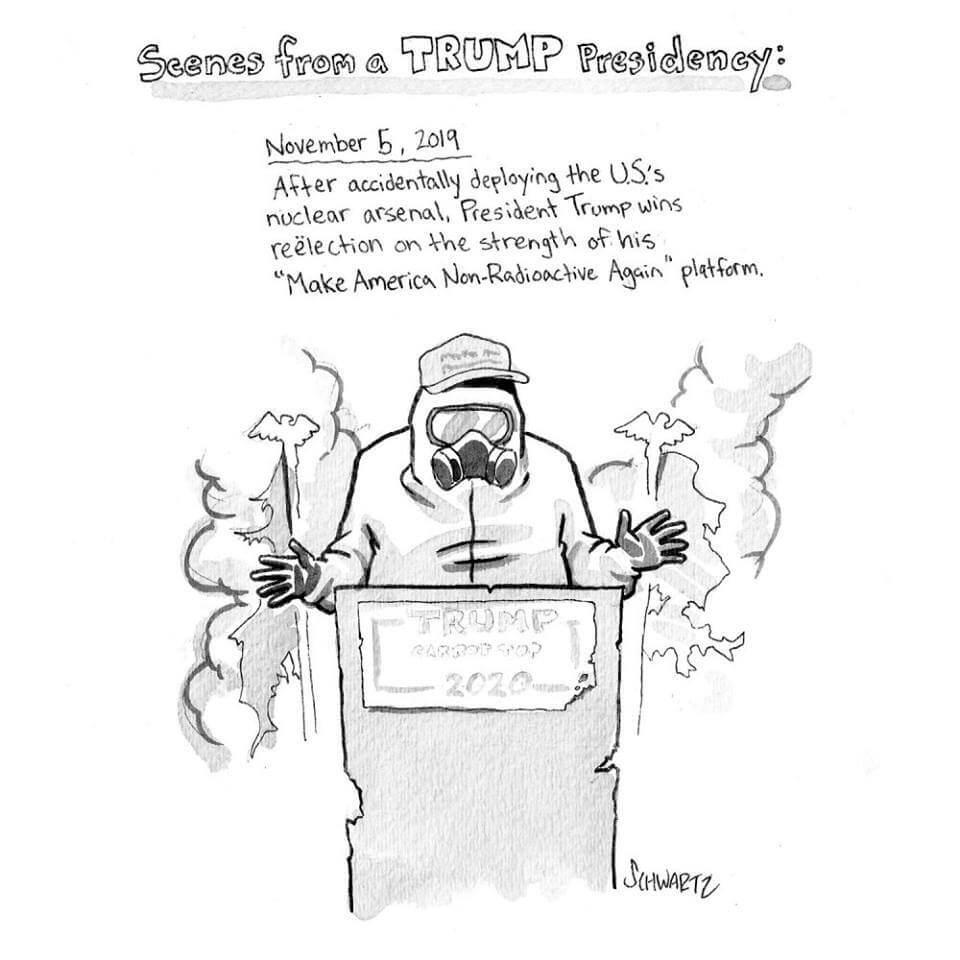
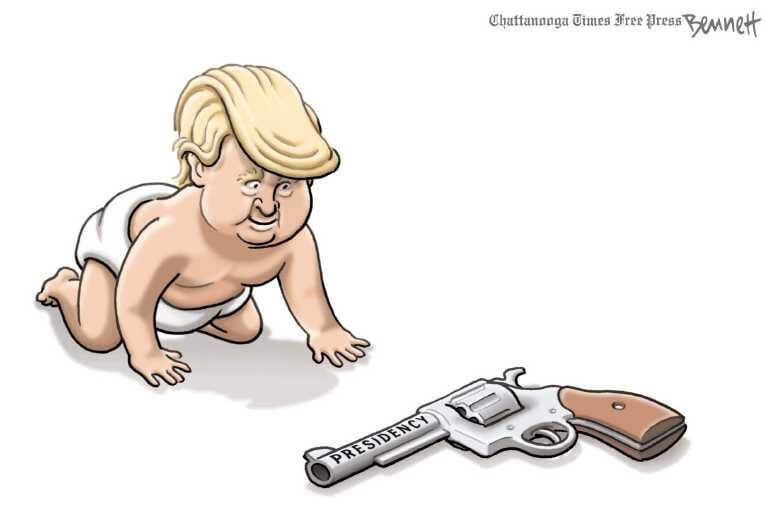

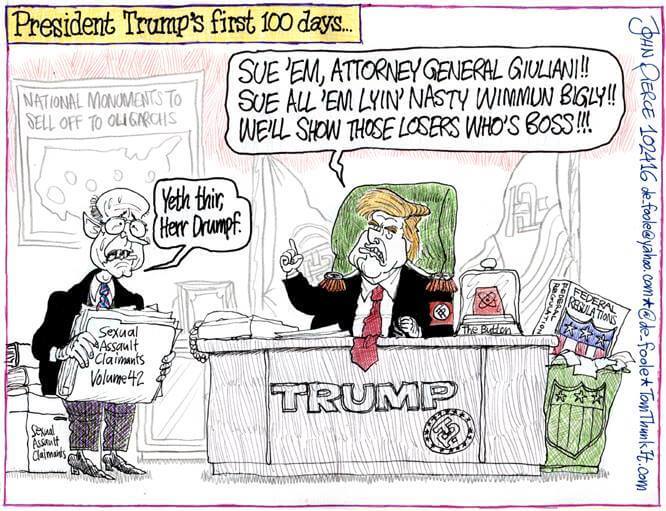
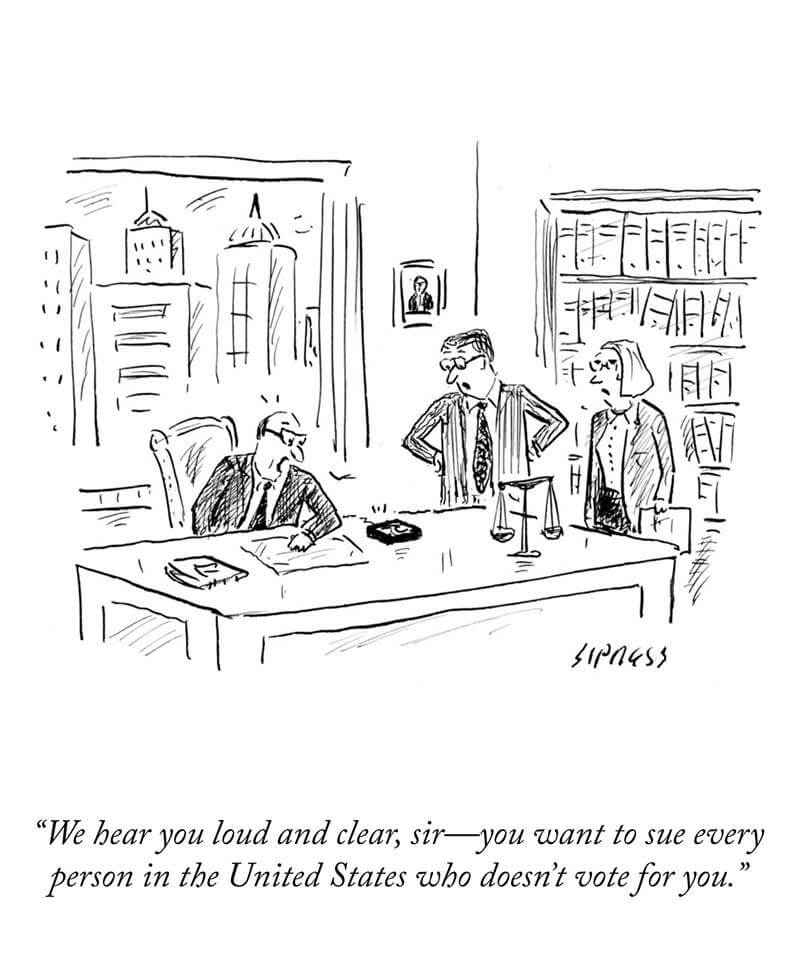
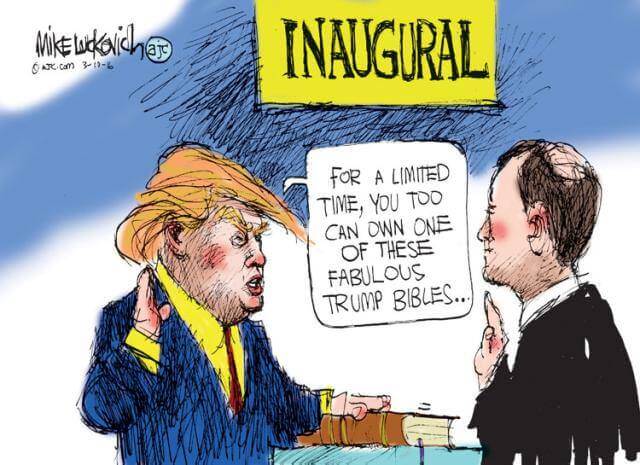
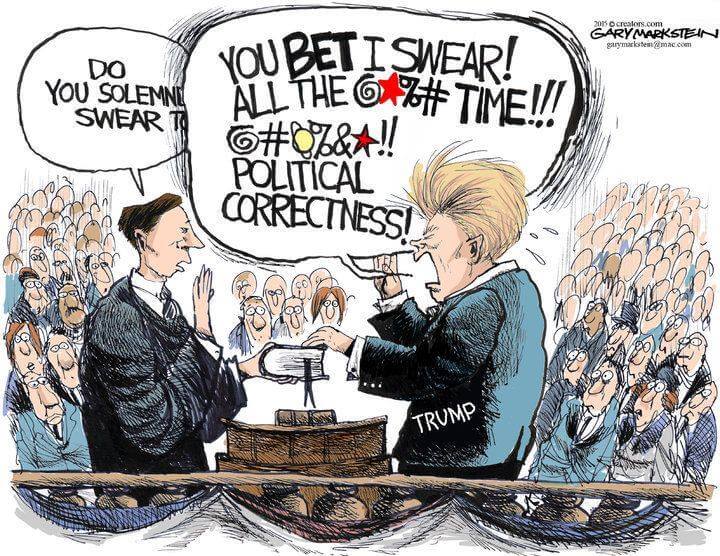
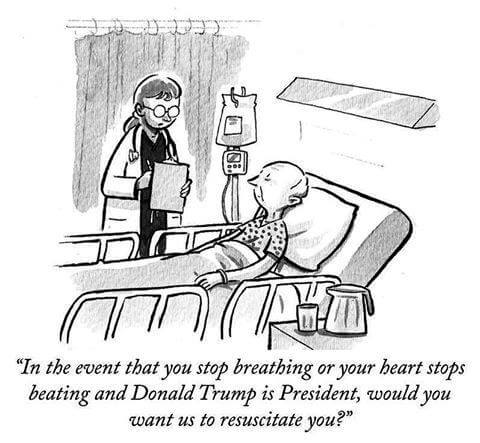
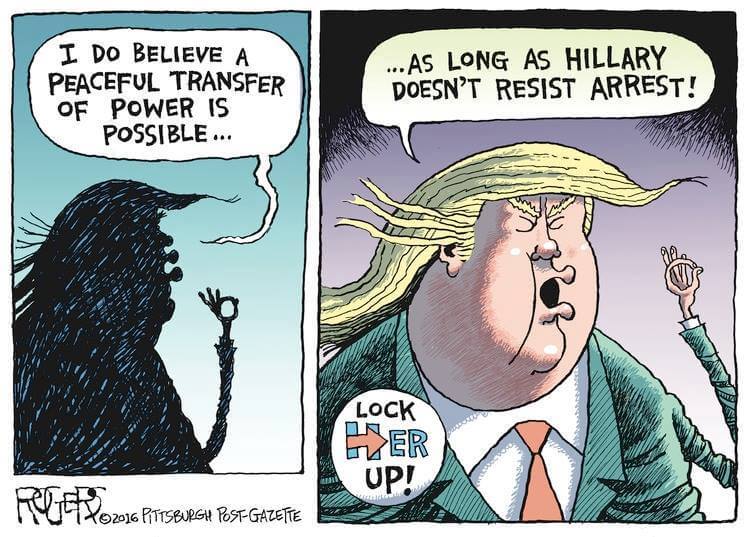

How utterly depressing. But the Dems really need to look in the mirror, to resist their knee jerk urge to blame the people who voted for third parties, not to mention the much greater number of uninspired people who just stayed home, i.e. those who’s votes they did not earn. Clearly, just being better than Trump isn’t enough to get you elected. Hillary made almost no attempt to learn from Obama how important a positive vision is, and most stupidly refused to really attempt to appeal to Sanders voters. Somehow the Democratic establishment thought running a status quo neo-liberal would be just fine in an anti-establishment election. Talk about missing the zeitgeist. We’ll be paying for their incompetence for a long time.
Yeah. The US, already notorious for its low election turnout, was worse than ever this time.
You are indeed mostly correct. The real blame lies with the knuckle-dragging mouth-breathers that revere ignorance, stupidity and meanness. And unfortunately, the US has way too many of them.
Too many, but not a majority. They can be kept at bay when the political system responds to people’s concerns and aspirations.
The real thing to blame, the thing that clinched it, was electoral fraud.
The election in all states where the discrepancy between exit polls and official count is more than 1-2% Should be investigated.
All ‘discarded’ votes should be made acessible to public scrutiny.
Maybe it is not too late to prevent a non-elect president-elect from taking office? Can US democracy still be saved?
Unless Hills sues, it’s a done deal.
I just heard from Move-On that Jill Stein might request a recount by hand, which would of course mean that all the candidates’ votes would be recounted.
I saw that too. It’ll be interesting to see if anything comes of it.
If enough money can be raised before the deadlines for the three states that are this Friday, Monday and Wednesday. I could be wrong, but I don’t think a third party action has ever resulted in much. Once the main benefactor gives up, it’s nearly impossible to stop the machinery leading to inauguration.
It sounds like the fund raising is going pretty well.
What happens if they discover Clinton won given that she conceded? Some seem to be indicating that her concession is legally significant.
I don’t think there’s any legal reason she can’t take back her concession, and probably would if it were cut and dried. But our tradition gives more importance to the smooth transfer of power than it does to ensuring the vote was fair – we’re the greatest democracy, you know – and Dems don’t like to be accused of causing a constitutional crisis either. Yes, this is odd given how litigious the US is. And whether this action is successful may depend on how much money is available if the Reps decide to fight it, which they surely will. So if the Dems don’t get behind this in a serious way it may flounder due both to lack of funds and also a twisted sort of moral logic that says if they’re happy with a questionable outcome, there’s no reason to put the country through the trauma, leaving us with the trauma of Trump instead.
Thanks. That makes sense of everything I’m seeing.
I heard that Stein has raised US$4.5 million towards a recount in Pennsylvania, Michigan, and Wisconsin.
Ken, if there is a constitutional crisis, and I definitely think there is, it is not the Dems who caused it. The cause is the fraud perpetrated by the Reps. The ‘voter suppression’ (from gerrymandering and crosscheck to allocation of voting stations with echo’s of Jim Crow), and a partisan counting process, discarding more than a million, if not millions of, votes.
I think there is more than enough ‘prima facie’ evidence for Hillary to retract her concession.
Look, I’m wary of conspiracy theories. Yes, 9/11 was a conspiracy -by Al Quaeda, Area 51 aliens? BS. JFK assassination? Possible, but highly unlikely. Holocaust denial? Very well documented it did take place. Etc etc.
But stolen 2016 elections? There is too much evidence in support to dismiss it.
– the Crosscheck abuse
– discarded’provisional’votes
– huge discrepancies between raw exit polls and official counts in swing states
-those discrepancies going systematically in favour of the same candidate, of the same party as those in charge of the count.
– only one swing state (Virginia) where the exit polls and count concurred, was where a Dem was in charge.
I think that it more than enough to have a highly jaundiced view of the present election. It really shouts ‘FRAUD’ to me.
–
I’m just telling you how it is. The point is that the US system is not very self correcting at all. An absolute right to vote is not enshrined in the Constitution and the voting process does not occur independently of the political parties. Voter suppression has a very long history too. It doesn’t matter how bad things look, unless there is obvious proof, which usually isn’t the case, you have to have the fortitude and money to challenge results in the court. I blame Dems to the extent that they’ve not taken the issue seriously enough between elections to do much about it, and have been stupid enough to allow the Reps to gain control in most States, knowing they’d be in a position to gerrymander, suppress and the rest of it.
Yes, Ken, that is where most of the blame lies. I can fully agree there.
You’re right that neither Congress nor the President would have authority to abrogate state gun laws. (Ironically, in the 1990s Congress tried to ESTABLISH gun-free zones surrounding schools, and that law was struck down.)
That said, on Day One the Justice Dept. position on gun rights will flip from hostile to supportive, and that could have some bearing if the issue is litigated. Also, Congress could make permissive gun policies a condition to receiving federal aid. But the president couldn’t do it on his own.
As for military installations, the commander in chief is just that, but surely (?) he will leave gun safety to the professionals.
Thanks once more for such a comprehensive analysis of the mess we’re in!
I’d never heard of the Five Eyes, sad to say.
The electoral college needs to be eliminated!
And already the bigots are acting up all over:
http://www.nytimes.com/2016/11/11/us/police-investigate-attacks-on-muslim-students-at-universities.html
“The electoral college needs to be eliminated!”
Yes, it is a system that is completely bonkers. Just imagine NY state. It has about 20 million people, of which 9 million in New York City. If you would have had an electoral college for New York City and another one for the rest of the state, NY state would have been a republican state! By accepting electoral colleges, designed for a time when the US was sparsely populated except for the East, democracy in the US is committing a slow suicide.
One big problem in the US is this quasi-religious belief that things that have been written and decided more than 200 years ago cannot be changed. Democracy dies if it does not correct itself and adapts itself to new insights and problems. Even the Catholic Church is better at this!
Good point. The constitution is like a religion – stuff can be added but not taken away, and any criticism is considered heresy. We used to have an electoral system that produced governments that were different from the popular vote, which led to a referendum where we voted for a more representative system. It’s not perfect, but it’s very very good, and certainly better than one that encourages the kind of extreme partisanship the US sees.
Whatever merit there may be to proportional representation in a legislature, it isn’t relevant to an independently elected head of state or chief executive, of whom by definition there can be but one.
Yes it is. Most USians voted for Clinton this year, just as most voted for Gore in 2000. In a proportional system each would have won the presidency. It is only the electoral college that gave the win to Trump and Bush.
Both candidates developed their election strategies based on the well-know electoral college that has been in place for 240 years; if the rule was “popular vote wins,” the strategies would have likely been very different with potentially different outcomes.
My strategy was different due to these facts (I’m in a blue state so i was free to vote third party). However, other Trump voters I know stayed home, knowing their vote didn’t count.
I’m just saying it would be fairer and more representative if that was the rule.
I do understand that the popular and electoral results diverged this year. I’m just puzzled trying to see what that has to do with the concept of proportional representation. The office of president can’t be divided proportionally. (Unless you’re going to have Clinton in power on Mondays, Wednesdays, Fridays, and part-time on Sundays, and Trump in power the rest of the week.) And I don’t see how direct popular election would mitigate partisanship (likely the opposite).
Sorry j.a.m. I expressed my original comment badly – I was half asleep. You’re right that they are different things. I’ve sort of said what I meant in another comment. I was meaning that the president could be elected by a direct popular vote, which would take a constitutional change, so isn’t happening. Or that electoral college votes could be allocated proportionately, which is what I think should happen.
jam is right, but as Heather says elsewhere, she’s talking about proportionality of EC electors. What we need for President is preferential voting.
Or adopt the National Popular Vote initiative, as ten states so far have. Of course, they’re all blue states, so this is unlikely too.
https://en.wikipedia.org/wiki/National_Popular_Vote_Interstate_Compact
I’d never heard of that. I’m not sure I like the idea on first reading – I’ll have to think about it some more.
Why not?
It’s a bit like all the EC votes going to whoever gets the most votes – it seems to mean that the votes of a heap of people don’t count. Or have I got it wrong?
I think so, as it makes all votes count and count more evenly. It makes the EC irrelevant (in current practice), so it is different than your solution because it would have the same effect as abolishing the EC, while your proportional method would preserve a diminished, but still greater influence of small states on the outcome.
I said in current practice above, because I’ve just today read the Federalist Paper #68 by Hamilton, on how the electors were supposed to operate. It is interesting in that electors are supposed to have complete free reign to select who they think best. It barely mentions even that the popular vote should be considered. This intent has of course been ignored for most of our history, as the Constitution says only that states may appoint electors as they wish, and they have for a long time done so very differently than intended.
http://www.constitution.org/fed/federa68.htm
It sounds like the Founding Fathers didn’t have much faith in the voters to choose the right person even then. For a bunch of Enlightenment ideals people, they sound pretty elitist. Otoh, I understand their pov as well. People do tend to follow the mob and aren’t that good at thinking for themselves. They’re even less good at expressing what they think if it’s different to the majority, and most are unable to support their position with sound arguments.
In the election for example, I hear pundits from both sides saying things like, “Just look at all the emails, just look at them,” without being able to say exactly what we were supposed to be looking at or what they proved.
I also heard a lot of people repeating fallacious arguments as if they were true and they would not be persuaded away from a particular pov whatever the evidence. It happened on both sides, but the Trumpsplaing by his surrogates was especially egregious. Just look at the ones explaining away his birtherism stance. And there’s a core of his supporters who still believe Obama was born in Kenya and no one can convince them otherwise.
It’s like some religious people and their stance on evolution. Ben Carson is obviously highly intelligent and one of the world’s leading neurosurgeons, but he still denies evolution because before he learned about that he’d already been brainwashed by an extremist religion.
Imo, the more intelligent you are the less excuse you have for not admitting it when you are wrong.
The trouble is, what’s the EC’s alternative to Trump? Pence and his dominionism would be worse, and choosing Clinton could result in violence from core Trump supporters given the way he got some so worked up.
An original rationale for the electoral college was to prevent a Trump situation by having the Establishment pick the president. Unfortunately, once the deplorables insisted on having their say, a president from TV Land became inevitable.
Similarly, Senators were appointed by state legislatures until the 20th century (with little evidence that popular election has improved anything).
Yes. People need a better understanding of how government works, and also need to get better at listening to the points of view of others followed by open and informed discussion.
The debates should have been part of that but they’re so full of lies, misinformation, and exaggeration, most people can’t know what to believe. Most people just don’t have time to be fully informed.
Heather, yes, they were worried about the mob, but also about external takeover. This sounds a bit silly to us today (even with talk of Trump being Putin’s puppet), but I can see why it had more currency in a new 18th century republic. The point of electors separate from senators and representatives is that they were appointed for that one job only, and didn’t exist as a group long enough to be corrupted, so the theory went. Also, there is no EC as such, which implies they all come together to vote, but 50 separate meetings that are supposed to occur independently, i.e without prior collusion. One wonders a bit why they included a plebiscite at all.
The framers left the method of choosing electors up to the states. A popular vote is not required, and in some cases the legislature appointed electors. In other cases local districts each chose one elector by popular vote. In time the dominant system became the statewide winner-take-all popular vote to choose a “general ticket” of electors.
http://www.fairvote.org/how-the-electoral-college-became-winner-take-all
So, if I understand correctly, the Electoral College was instituted to prevent anyone unfit for the presidency actually assuming office. That means that the electors would carry out their constitutional duty by defecting from Trump, and stronger, be at least negligent not to do so.
And if so, we still have to see whom they would choose, president Cruz, Pence or Palin sounds even worse than president Trump.
My hopes (0,001%) are for, say, a president Rice or even Brown.
Note, I do not expect the EC to carry out it’s constitutional duty.
I don’t expect them to do their duty either.
I find the US electoral system at least unfair and probably corrupt. It’s no wonder some people think voting for someone like Trump is their best option. It’s a bad decision imo, but I understand it.
It is not the EC per se. Just look at the discrepancy between the exit polls and the ‘final’count. Something the US used in 2004 (under George W, not Obama) to disavow the Ukranian elections.
North Carolina. Exit: 2.1% win for Clinton, final count a loss by 3.8%, difference 5.9%.
Pennsylvania. Exit: 4.4% win for Clinton, final count a loss by 1.2%, difference 5.6%.
Wisconsin. Exit: 3.9% win for Clinton, final count a loss by 1%, difference 4.9%
Florida. Exit: 1.1% win for Clinton, final count a loss by 1%, difference 2.1%.
The electors of these four states should go for Clinton (but of course they won’t).
Note these ‘differences’ are approximate, since the Clinton exit poll lead was established before purging, so refers to a greater absolute number of votes, they are hence a slight underestimate.
And we did not mention eg. Ohio, where Trump won by less than 14,000 votes. In Ohio the anti-hacking ware of the voting machines was switched off in predominantly ‘coloured’ areas; still surprised?
Even without Ohio or Arizona, Clinton won this election hands down if not for electoral fraud.
There is no independent or bipartisan control on which criteria were used to discard votes, and obviously a lot were. Voting and discarding results are not even public, which opens the door wide for all kinds of manipùlation.
The 2016 elections were rigged (yes Donald, you were right), stolen….I can’t fathom why the US media and population are not up in arms and court cases.
I agree. There’s so much that happens in the US elections that other democracies just don’t allow. Nobody in power does anything for fear of the public losing confidence in the system, but they shouldn’t have that confidence.
When it’s the difference between Gore and Bush, it might not be such a huge deal. Sorting out Climate Change was set back years but there’s no way of knowing for sure about other things. But allowing someone like DT lose in the White House is genuinely dangerous. It shouldn’t be allowed to happen for the sake of maintaining public confidence in the system.
If everything is okay, a full enquiry will confirm the result, which DT should welcome. Look how many millions Congress spends on fake enquiries, such as Benghazi and Planned Parenthood. It’d be good to see a real one.
Yes, the more I investigate the US electoral system, the more it starts resembling the one of a banana republic.
I thought the 2000 Florida fraud was kind of a special case, an abberation, but I found out it is not. It is systematic. And, as said, there are no independent or bipartisan mechanisms in place to check it. Discarding votes is ridiculously, and shamefully, easy in many US states, Including ‘swing’ states.
What is also damning is that the discrepancies between exit polls and ‘official’ counts systematically went in Trumps favour, often by big margins that litterally *shout* fraud (I gave you some numbers above, but not Ohio, in Ohio the discrepancy appears to have been 8+%).
I’m horrified to find out that the country that portends to export democracy to the rest of the world has such a flawed election process itself.
A country that rejects elections in other countries if the exit polls -about the most reliable measure we have, nearly all experts agree there- do not closely match the end results, but stays mute when it happens at home.
What to think of this silence? Is it the fear of being seen as a bad loser? The cognitive dissonance that the world’s prime democracy is not all that democratic, that the system fails? I’m trying to think of other reasons for this silence, but cannot come up with anything.
I think the powers that be think keeping peoples’ confidence in the process is more important. Personally, I think that’s outrageous because it can’t last and it will make things worse when a majority realize what’s going on.
However, because of the way the system is, with so many livelihoods dependent on maintaining the status quo and virtually no bipartisan cooperation, there’s no incentive for those in power to reform beyond doing the right thing.
An enquiry would probably destroy the reputations of thousands because there’s such a litigious atmosphere and culture of blame. Too many can’t afford for it to happen imo. There’s just too much corruption.
Most of the rest of us in the developed world already have a fairly low opinion of US democracy, but we don’t really think about it too much. Doing something about it would bring the matter front and centre. I think USians think their reputation would be badly damaged, but we’d actually have far more respect if the country was honest about the issue.
I think you are very right there. The US reputation as a democracy, let alone a model democracy to be emulated, lies in tatters.
I feel like a child from a happy-happy family who has just caught daddy in flagrante delicti with the ‘household help’ (or mommy with the milkman, for that matter. Are there still milkmen?). Deep disillusion, although the 2000 Florida fraud should have been a warning.
on military bases yes he can, just by saying so. as commander and chief he has that power. an for else where, all he has to do is enforce 2 constitutional amendment the 2nd and the 14th, the US constitution is above state constitutions and legislatures.
if you want to understand the electoral college this will help http://www.historycentral.com/elections/Electoralcollgewhy.html
Yes, that’s a very good article, thanks.
I have been railing against the electoral college for at least 40 years and have read many such articles. All they do now is accentuate my despair (though I think it’s important for everyone to know the EC’s rationale so it’s important to keep posting these). Essentially they tell us it’s the biggest f’n Catch 22 in our government. It favors the smaller, rural, invariably conservative states over the opposite, and to abolish it we need to have the majority of the same states ratify a constitutional amendment. Right.
Or persuade such states to vote for Democrats. Uh huh. My favorite–calculate how many blue staters need to take up temporary occupancy in the red states to get an amendment ratified.
I like to think it’d be possible for a really committed coalition of progressives to devote days/months/years to explaining to the rural states how much more the Democratic party protects their interests than the GOP. That’s gonna require some strong self-examination in the Dem party itself. But by all means, let’s go on concentrating on Halloween costumes and other vitally important “issues” instead.
I have to disagree, the electoral college is one of many checks and balances in the “USian” system, a constitution republic with a representative democracy (not a direct democracy, thank sky guy). It prevents politicians from promising to screw over one minority (rural dwellers) by one majority (urban dwellers.)
We have many other such “undemocratic” checks in place to protect other minorities…judges that can overturn popular and unconstitutional legislation, presidential and governor vetoes (thereby requiring super majorities to overturn in turn,), etc.
I think this idea that you can change one variable (eg. the electoral college) without this drastically affecting all other parts of the system is deeply wrong.
I’m not saying that we shouldn’t improve or even change the system, but I do worry that we might commit Chesterton’s fence fallacy and cause more damage than we fix.
When the constitution was written, the rural guy was the majority, so it wasn’t about stopping them being screwed over. The whole system is designed with checks and balances that is supposed to stop things like the election of Trump happening.
Personally I think having voters select the candidate is not a great idea. Look where that got the Labour party in Britain. It also costs a fortune. The amount of money in politics is outrageous. People are chosen by their ability to excite a crowd, rather than their ability to actually be president. Even things like good looks and not being overweight are considered important, especially for women.
There’s also too much focus on fringe social issues because of the loud and moneyed voice of groups like Focus on the Family who think they have the right to force their religious views on everyone else just because they always have.
With respect, that’s backwards: Pro-family groups arose in reaction to the anti-family Left hijacking our civic, cultural and educational institutions, and then using the power of these institutions and the state to trample conscience rights and impose their perverse ideology.
The left isn’t anti-family. Where do you get ideas like that? Did you know, for example, that atheists have a lower divorce rate than evangelical Christians, or that the rate of single mothers is highest in the Bible Belt?
My conscience tells me that all people are equal whatever their sex, race, culture, sexual identity, sexual orientation, colour, age etc. Groups like Focus on the Family want to legislate against some people having equal rights. They don’t think same sex couples should be able to marry or have children, they don’t think a transgender women should be able to use a women’s bathroom, and they don’t think a women who is pregnant via rape or incest should be able to have an abortion. They are the perverse ones.
And yes, as far as I’m concerned they can stick their bigoted opinions where the sun don’t shine and go f*** themselves.
It’s an easy game to play, Heather. First define your terms like “family” exclusively. Then complain others are taking your rights away when that gets challenged, even though your right to have any sort of family you want still exists.
Always need to be careful, yes. I think it would be great to make important all those people’s votes that don’t currently matter. So what might the negative impacts be?
@Minroad: Well said. Our republic’s robust resilience over many generations indeed is due to an exquisite system of checks and balances.
And the electoral college is about more than just balancing rural vs. urban interests. Consider that California by itself makes up more than 12% of the USA’s total population. And just six megacities (NYC, LA, Chicago, Washington, San Francisco, Boston) together comprise more than a quarter of the population — and far and away the lion’s share of wealth. Under a direct popular election scheme, a few densely-populated regions of staggering wealth would always dominate, to the detriment of voters in hundreds of less prosperous cities and communities, let alone rural areas.
As Minroad suggest, the electoral college can be modified in various ways to better deal with minor parties, “wasted” votes, and potential ties. But direct popular election is a bad idea, and a non-starter anyway.
My opinion is that electoral college votes should be proportional, like those two states where it is already. The article Larry Sullivan linked to noted that “winner takers all” is not a constitutional requirement, so it could be changed. However, it would only be fair if all states did it. If California didn’t do it, but Texas did, that would be just as unfair giving a perpetual advantage to the Democrats .
I’ve always found the idea that getting 50.1% or 90% gives you all the votes is unfair.
It also means that elections basically focus on ten states that are up for grabs, and all those rural Republican states get ignored anyway. If the EC votes were allocated proportionately, the votes of all states would count. Candidates would have to do a better job appealing to the people and provide policy ideas to be discussed.
There are usually a lot of competing policies, which should be what it’s about. This time Trump didn’t have many, and he didn’t even pay those who were doing his policy work for him: https://www.washingtonpost.com/news/josh-rogin/wp/2016/09/08/inside-the-collapse-of-trumps-d-c-policy-shop/
I definitely concur with allocating electoral votes proportionally, at least for the largest states. It could be easily adopted — states could simply enter into a compact to switch at the same time when some threshold had been met.
Ironically, a couple of years ago Republicans in Pennsylvania proposed switching to proportional distribution. The Democrats balked. I imagine about now the Republicans can’t stop thanking the Democrats for talking them out of it, and the Dems are kicking themselves.
Yes – whichever party is in power takes advantage. There are no clean fingers there. Both parties are now quite open about how they will gerrymander electoral districts too once they get control. It’s disgusting imo.
Despite preferring the Dems, I’ve gotta say that the Pennsylvania situation serves them right. However, I bet the Republicans weren’t being entirely altruistic either.
Yes, they both do it, but Reps are the masters. An analysis I read a while back of all electorates concluded that 55% were gerrymandered in favour of Reps, 35% not significantly at all, and only 10% in favour of Dems.
J,a.m., why would you limit proportional elector representation to the largest states? Why not all states?
I agree with you that proportional allocation of electors is a good idea in principle, but even with proportional elector representation, the glaring inequality of voter weight (more than 3 times in several cases) is not really addressed.
I do understand and agree that some balance between states is needed, but 3 to 1? I think that a 2 to 1 should be the absolute max, and of course still not really fair.
I have no good solution, no win-win, sadly it inevitably appears a real zero sum situation,
Speaking of the “EC’s rationale”, not saying this will happen, not even sure I’d want it to happen, but interesting. And with the Trump University trial looking like it will occur before the EC votes, it could be even more interesting.
http://www.huffingtonpost.com/douglas-anthony-cooper/the-electoral-college-was_b_12897066.html
Interesting. If only!
On Jerry Coyne’s website ‘WEIT’ poster Jblilie posted a list of relative weight of votes for the EC. If a Wyoming vote were 100%, a New York or California vote would be only 28%. That is nearly four times the weight.
It is as if voters from ‘rural’, scarcely populated states could vote 3 times (and even more in Wyoming’s case). Now there should be some balance between regions, but more than 3 to one appears excessive. “One man, three votes”! Not fair really.
But since, as you mention, these priviledged rural states invariably vote conservative, I do not see much room for change either.
It is hair-tearing that e.g. a deeply religiously indoctrinated Oklahoma ‘redneck’ has so much more weight than say a New Yorker (such as both Trump or Clinton are ?) in our world.
Note, despite the inequalities of the EC vote, Clinton appears to have won the EC, if it were not for plain electoral fraud.
Since the US is still a, nay the, Superpower, should the rest of the democratic world -so heavily impacted by the US- not get some, say eg. 60, electors too? ?
Yes, I’ve been following this issue on WEIT as well. (And appreciating your posts both here and there. We’re definitely on the same page!)
I really don’t see why some regions should have any extra weight at all; why the popular vote shouldn’t be the only criterion for winning. Perhaps the Dem strategy should be to come up with their own demagogue. It appears easy to learn to say what the rural-staters want to hear.
Seriously, the Dems need to figure out why they were once the party of the working class, and how they can restore that. Of course, that’s a lot more difficult now that unions themselves are in eclipse, and even if they weren’t, sadly, they’ve lost the respect of their members.
As to giving the rest of the world a say–on a scale of one to ten, from smart ideas to really hideous ones, I’d say that’s about a 50. 😀
I don’t see why, when it comes to president, anyone’s vote should count more than anyone else’s. I can understand the difference in the Senate, but not for the presidential vote. I think Congress should be fairer too – I think each congressperson should represent the same sized electorate in terms of population and should be elected by popular vote.
I’m not sure that Dems have as much to worry about as everyone’s saying either. Clinton got 2 million votes more than Trump. Most people wanted her to be president. It’s only the electoral college that means that isn’t happening and whatever side you’re on, you can agree that’s not fair.
Heather, I couldn’t agree more. (Except about the worrying part. Every time I tell myself it’s not as bad as it seems I remember that both houses of Congress are, and in short order SCOTUS will be, in Republican hands. And here we were eulogizing the GOP less than three weeks ago.)
I’m sorry you found my (tongue-in-cheeck) idea to give the rest of the democratic world some electors so hideous as to fall outside the scale by 500%. ?
The EC, as mentioned, appears to have been instituted precisely to prevent an eminently unqualified demagogue like Trump accessing to the presidency. It has failed. However, as I think is clear, this failure is/was due to the vote rigging in the swing-state’s where Reps did the overseeing of the count. And how did they do that? By gerrymandering, crosscheck, etc.
My point is that, although the EC system is inherently unfair (and Trump would obviously have lost if it had been), it would *still* not have gone Trumps way, if not for plain fraud.
“My point is that, although the EC system is inherently unfair (and Trump would obviously have lost if it had been), it would *still* not have gone Trumps way, if not for plain fraud.”
That’s how it looks to me, too.
And me.
nicky, the EC hasn’t failed in it’s task yet, though it almost certainly will on 19 Dec when it votes. It hasn’t been in a position to do it’s job of preventing a Trump since around 200 years ago when States started selecting electors based on their allegiance to candidates. At about the same time, a few states started the winner take all system to give their state’s own candidate an edge. Like a sort of evolutionary game theory, this practice spread to nearly all the other states so that the advantage gained by the early adopters was neutralised. Really the only reason for the EC now is to preserve the advantage it gives the smaller states. And this advantage has grown during the last hundred some years since the number of representatives in the House was frozen at 538. If the original population per rep had been preserved instead, it would be interesting to see how different the outcome of this election would be.
At least the TPPA is dead. But wait, what are the odds Trump will deliver on his neanderthal social agenda, but leave the corupt, money-driven Washington political system in place?
http://www.nytimes.com/2016/11/12/us/politics/trump-campaigned-against-lobbyists-now-theyre-on-his-transition-team.html
Actually, I wouldn’t bet on that yet. The Republicans want TPP, and they have the House and Senate. Trump could easily get around this in a similar way (but not the same way) that Hillary would have. He’ll say he’s renegotiated part of the deal to make it better, and it’s great for America now, believe me. Believe me.
That was my point, Heather. So much for draining the swamp of special interests 🙁
Sorry – I replied before I read the link.
A prediction for Trump’s first day that you may actually approve of: At the conclusion of the oath of office, instead of the customary “So help me God”, he exclaims: Bigly!
Would certainly be better than “I’ve got Lady Liberty by the pussy!”
But he has, now doesn’t he? Tiny hands with a firm grasp ?
Trump may call himself a Christian, but I don’t believe he thinks he needs help from anyone, including his God.
I do not think he is a Christian, some of the very few things I hold in his favour. I suspect he is a closet atheist, who doesn’t care either way.
However, by choosing a religious fanatic (lunatic?) like Pence as his VP, he loses any favour his suspected stance might have had with me.
Trump Empire (the USA’s new name) is being formed.
Don Jr, Ivanka, and Eric all have senior roles in his transition team.
https://www.washingtonpost.com/news/the-fix/wp/2016/11/11/donald-trumps-questionable-blind-trust-setup-just-got-more-questionable/?tid=sm_fb
81% of white evangelical Christians voted for Trump according to Pew Research: http://www.pewresearch.org/fact-tank/2016/11/09/how-the-faithful-voted-a-preliminary-2016-analysis/
John Pavlovitch has this to say to them: http://johnpavlovitz.com/2016/11/10/white-christians-who-voted-for-donald-trump-fix-this-now/
Thanks for the Pavlovitch!
Hi Heather,
This is not about the above post, but I don’t know your email.
Just hoping all is okay with you in light of the earthquake. I love your comments on Jerry Coyne’s website, and I also have read many posts on your website….so thank you but hoping all is ok with you—
best Debbie
Hi Debbie
Thanks so much. Yes, I’m good, and so is everyone I know. Even though I’m hundreds of kilometres away, the earthquake was still strong enough here to wake me and open or close doors and open drawers. It went on for ages (at least two minutes). I was in bed (it was just after midnight here) and at one point I put a pillow over my head in case the picture above my head fell down.
There were also four aftershocks strong enough for me to feel this far away (about 750 km I think). My brother and his wife and kids are only about 130 km away from epicentre and they’re all good with no damage to their home or his business.
We’re used to earthquakes and have pretty strict building regulations. The big Christchurch earthquake three years ago only killed a lot of people because there was a building where those regulations weren’t adhered to – most people who died were in that building.
See here for ongoing coverage: https://www.tvnz.co.nz/one-news/new-zealand/earthquake-special-live-stream-rolling-coverage-nz-rattled-dozens-quakes
Very interesting article from Scott Ritter on the US/Russian relationship and potential for nuclear conflict. I just can’t trust that Trump will manage this well, as Ritter clearly hopes he might, but just as clearly the course we’re currently on is very dangerous, as I’ve often said.
http://www.truthdig.com/report/item/a_genuine_us_reset_with_russia_is_long_overdue_20161115
Nicky–and Heather–
You’ll love this.
http://www.nytimes.com/2016/12/03/opinion/sunday/why-blue-states-are-the-real-tea-party.html
Sigh.
Amazing isn’t it, yet the beneficiaries are the ones who complain about socialism. If it weren’t for the continuance of slavery I sometimes think we’d be better off if the South had won the war just to be rid of them.
By the way, and it’s another topic entirely, but this is a demonstration of exactly why the euro is in crisis. The US works economically overall despite the large difference in states’ performance, because there is political union as well as monetary union. Monetary union on it’s own only works in good times, because the lower performing jurisdictions can attract investment by raising interest rates. But in bad times, this doesn’t work. What is needed then is a political agreement that sends the investment where it’s needed anyway. That’s the main reason why Mississippi isn’t bankrupt, but Greece is.
Greece also needs some major structural reform in its economy. They’ve been promising to do that ever since they started receiving loans from the EU, and they haven’t done it. Some of their economic practices are pretty outrageous. While they’re portraying Merkel as Hitler, the German people are funding Greece in the same way New Jersey does Wyoming. And the main reason Germany has so much available to lend is Germans are much better savers than Greeks. The Greeks live well beyond their means.
I’m sorry, Heather, but too much of that is just myth that the neoliberal troika wants us to believe. Yes, Greece was and is in need of reform, and that was never denied by Syriza when they became the govt. What they objected to were plans that would ensure there was no growth possible, which therefore amounted to asset stripping, and which in a few years will require yet more loans. Your analogy of NJ/WY and Germany/Greece is completely wrong. NJ sends real money to WY, which then get spent locally on infrastructure and also unemployment benefits, health benefits, etc, while well over 90% of the latest loan to Greece went to pay off older loans. This money never left the German and French banks that loaned it and has not benefited the Greek economy at all. The German people are funding the banks previous bad loans. It is a game played to pretend that Greece is solvent when it is not, so that the banks don’t have to write off their bad loans.
The Greeks lied about their economy to get into the EU in the first place, although the EU knew they were lying and ignored it because they wanted Greece in the EU so much.
I agree my analogy went too far, but you cannot doubt that the Greek economy needs structural reform. I’m not talking about US-style structural reform which means cuts to benefits etc, but the style that means providing jobs via investment in infrastructure to kick-start the economy.
Yes, the previous Greek govt was in cahoots with the EU. It never should have been allowed into the eurozone and the books were fudged with both sides in full knowledge. The new govt wanted to take a different path, but was not allowed to do so. They wanted exactly what you say should happen, “providing jobs via investment in infrastructure to kick-start the economy”, but instead got “US-style structural reform which means cuts to benefits etc”. Though to be fair to the US, they have been against this austerity approach from the start and argued the EU should not impose it on Greece.
Great article!
The US is in need of some serious electoral reform. I think this is where Sanders and Warren should be focusing their efforts.